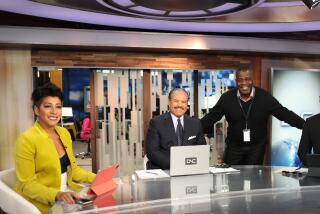Trinity Unit Drops Bid for Station : TV: The Tustin-based religious broadcasting network was challenged by foes who alleged that its subsidiary does not meet FCC rules designating minority control.
Faced with a Federal Communications Commission inquiry, the Tustin-based Trinity Broadcasting Network withdrew a subsidiary’s application to buy a Philadelphia-area TV station after employees of the station and a broadcasting group questioned the subsidiary’s claim that it is controlled by minorities.
Trinity’s attorney wrote the FCC on Oct. 1 to tell the commission that the subsidiary, National Minority TV Inc., is no longer interested in the license of WTGI-TV, a bankrupt UHF station for which the Trinity had already paid $4 million.
An employee of WTGI, along with several attorneys who represent minority broadcasters and a group calling itself the Ethnic Programming Legal Defense Fund, challenged Trinity’s purchase. In their petition to the FCC, they called National Minority TV “a sham entity” and “a transparent minority front” under the direct control of Paul F. Crouch, who is president of both Trinity and National Minority TV.
“The deal is dead,” said David Honig, attorney for the challengers.
Because of the challenge, a bankruptcy judge canceled the previously approved deal and ordered Trinity’s money returned.
The substance of the challengers’ allegations, and the subject of the FCC inquiry, focuses on how National Minority TV is set up. The nonprofit, tax-exempt organization has three voting board members: Crouch; P. Jane Duff, employed by Trinity as Crouch’s assistant, and Phil Aguilar, who appears frequently on Crouch’s nightly talk show and whose Anaheim-based Set Free Ministries is supported by Trinity.
Crouch is white, Duff is African-American and Aguilar is Latino.
In a brief filed with the FCC, National Minority TV had argued that the commission requires only that minority board members have enough votes to control the organization. But while the challengers acknowledged that having two of three minority board members would ordinarily satisfy that requirement, they alleged that Trinity, which is not minority-controlled, “cynically and brazenly used (National Minority TV) to acquire and control more than 12 full-power television stations.”
Whether National Minority TV is “minority-controlled” is a key point. In hope of diversifying media ownership, Congress decided that a network may own more than the existing limit of 12 TV stations if the additional stations are controlled by minorities.
In its challenge, Honig’s clients asked the FCC to revoke all of Trinity’s U.S. broadcast licenses because of Trinity’s creation of a “fictitious” minority organization. Failing that, it asked the commission to require that all of its stations file for renewal earlier than now required to permit other challenges.
Those requests are still pending, despite the collapse of the WTGI deal. In an Oct. 11 letter to National Minority, the FCC accepted the application withdrawal but said the commission would continue its inquiry into the minority status and other issues raised in the case.
“In view of the issues raised in the petition, . . . the commission must consider and resolve the issues, regardless of the dismissal of the application,” wrote Barbara A. Kreisman, chief of the FCC’s video services division.
On Sept. 18, the FCC wrote to Trinity’s Washington communications attorney, listing 27 questions regarding National Minority TV’s structure, ownership, finances and governance.
In its letter, the commission requested sworn answers to the queries within 20 days, which Trinity’s Washington communications attorney provided.
“We sent them quite a bit of material,” said Trinity’s attorney, Colby M. May. “We were very forthcoming and candid.”
May said that “everything is on the up and up” with regard to National Minority TV’s governing arrangement. He said Crouch had never concealed that there is “a close, close working relationship and affinity between Trinity and NMTV.”
Trinity, which Arbitron recently called the most-watched religious TV service in the country, has been growing at an almost uninterrupted rate. Besides the 13 full-power stations it controls directly, the network includes scores of other stations owned or influenced by other Crouch family members and Trinity loans.
More than 200 stations carry Trinity’s religious broadcasting in the United States, along with several dozen stations around the world that the network has built or bought.
More to Read
The complete guide to home viewing
Get Screen Gab for everything about the TV shows and streaming movies everyone’s talking about.
You may occasionally receive promotional content from the Los Angeles Times.





